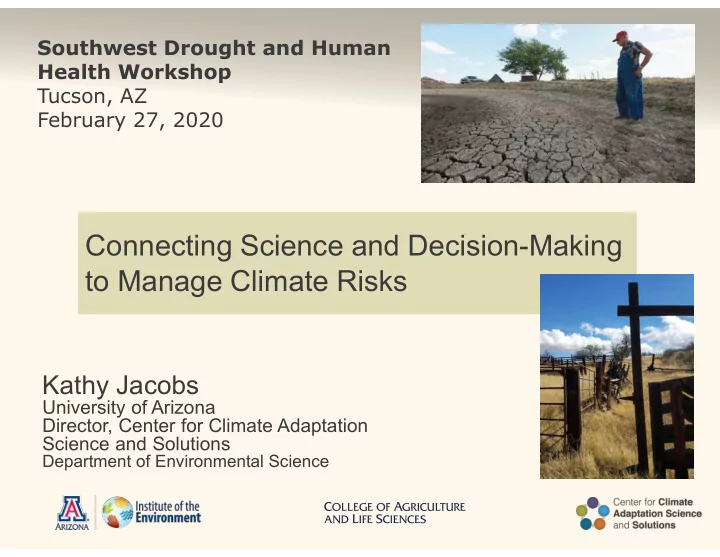

Southwest Drought and Human Health Workshop Tucson, AZ February 27, 2020 Connecting Science and Decision-Making to Manage Climate Risks Kathy Jacobs University of Arizona Director, Center for Climate Adaptation Science and Solutions Department of Environmental Science
Why is Climate Risk Management Important? We have three choices: mitigation, adaptation and suffering. We are going to do some of each. The question is what the mix is going to be? The more mitigation we do, the less adaptation will be required and the less suffering there will be. John Holdren, White House Office of Science and Technology Policy Acclimatise
Managing Risk: Connecting Science and Policy • Many frames for understanding the interface between science and policy, including understanding: – the roles of institutions , – perceptions of risk, – ways of learning , knowing, and engaging, – the decision context .
Bridging the gap Between politics and reality, Between science and decision-making… Understanding the role of science and communications in managing risk
Acknowledging legitimate differences in perspective and training
Managing Climate Risk Managing risk requires: • understanding likelihood and consequence of future events… • understanding intensity and duration of future climate drivers AND understanding underlying sources of vulnerability, including social, institutional and physical vulnerabilities. 6
Managing Risk: Who makes decisions? What is at Risk? Systems that Interact at Multiple Actors at Multiple Scales Multiple Scales • Individuals • Water • Non-governmental • Energy organizations • Communications • Businesses, corporations • Forests • Utilities • Agriculture • Universities • Coastal Management • Cities and towns • Fisheries • Watersheds • Transportation • Indigenous people • Federal agencies • Etc. • International/global actors 7
Learning and Knowing: Challenges of Climate Change for Decision Makers • Knowing “what to adapt to” especially if outside the envelope of prior experience • Non-stationarity is a new paradigm • Understanding interactions - Trends vs abrupt change/extreme events • Linkages and cascading effects • Politics
Barriers to Managing Risk : Are we in a Post-fact world? Washington Post Fact Checker “President Trump made 16,241 false or misleading statements in his first 3 years in office”
Overcoming Barriers • Long-term relationships between scientists (academics) and decision-makers • Understanding the implications of “co- production of knowledge” • Investing in interdisciplinary knowledge in a “real world context” • Capacity building (for both parties)
Science translation: Simplifying assumptions for managing risk • It is going to get hotter • Streamflow is likely to be reduced (impacting supply) • ET will increase (impacting demand) • Drier on average with intense rainstorms • Likelihood of cascading effects (eg heat waves, brown outs, forest fires, air quality problems, sedimentation of reservoirs, etc.) Don’t let the perfect be the enemy of the good
What CCASS does: • Convenes and supports adaptation projects across the UA campus and externally • Builds capacity to support stakeholders more effectively on the ground • Coordinates and clarifies roles, particularly related to stakeholder engagement and science support Themes: Adaptation and International Development Ecosystem Resilience and Adaptation Tribal Resilience and Adaptation Water Security, Planning and Policy Food Systems and Adaptation Adaptation and Health
What CCASS does: • Aggregates knowledge across a wide array of projects and scales • Coordinates hands-on support for local and regional water managers, utilities, cities, watershed groups and Tribes as they prepare for the impacts of climate change
CCASS Themes/Grand Challenges • Bridging the gap between science and decision making • Managing risk in a complex, interdisciplinary and multi-sectoral context • Supporting transformational adaptation and preparing for extreme climate and weather events • Finding synergies among adaptation and mitigation strategies to promote sustainability
The US National Climate Assessment/SCAN National Climate Assessment Mission (since NCA3) To advance an inclusive, broad-based, and sustained process for assessing and communicating scientific knowledge of the impacts, risks, and vulnerabilities associated with a changing global climate in support of decision-making across the United States. 2000 2009 2014 2017 2018 NCA4 NCA2 NCA1 NCA1 NCA3 NCA4
SCAN: A Citizen-based version of the US National Climate Assessent “Evaluating Knowledge to Support Climate Action: A Framework for Sustained Assessment” www.climateassessment.org
CCASS Colorado River Activities Kathy Jacobs Center for Climate Adaptation Science and Solutions September 10, 2019 Borderlands Brewing
NCA4: Colorado River and Climate Change
Colorado River Conversations: Focusing explicitly on low probability, high consequence events; empowering new voices; focusing on the river as a system Range of Traditional Planning Efforts Low Low Historic Historic Probability Probability Conditions Conditions High Impact High Impact Events Events
New Roles for Universities in Linking Science with Decision-making • Addresses the impacts of changing climate on both supply and demand • Includes analysis of environmental impacts (riparian areas) • Employs a scenario approach to explore range of futures (with and without adaptation measures) • Uses multiple approaches to downscaling, as input to groundwater and surface water models
SW Adaptation Forum / SW Practitioners’ Adaptation Network (SPAN)
Managing Risk: Keep your eyes on the ball ! GMY6XQ Kathy Jacobs bs jacobsk@email.arizona.edu www.ccass.arizona.edu nca2018@globalchange.gov
Recommend
More recommend